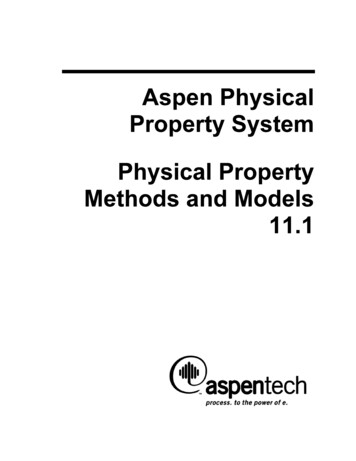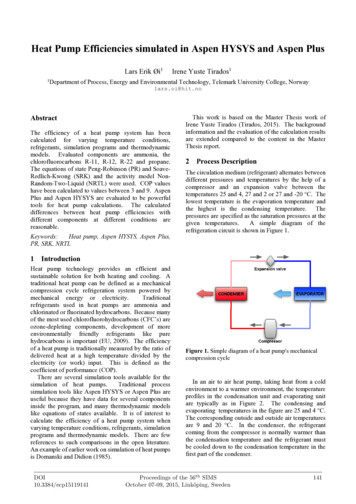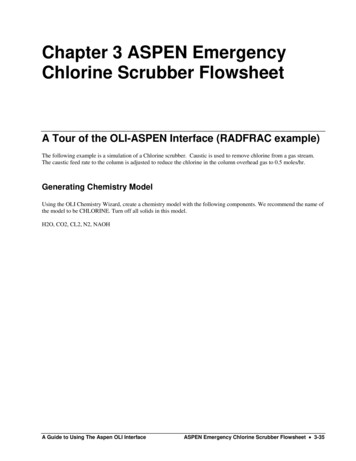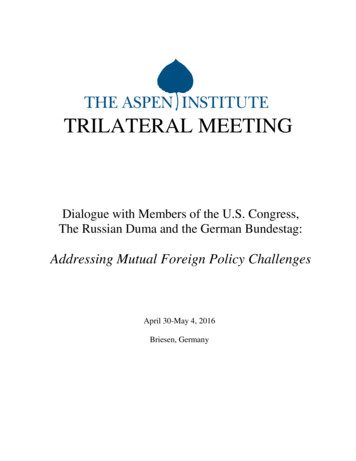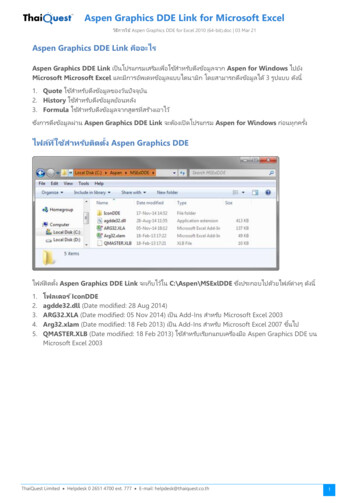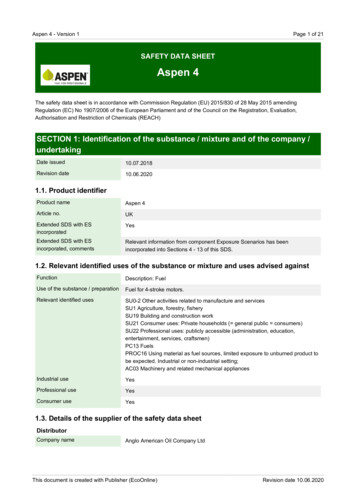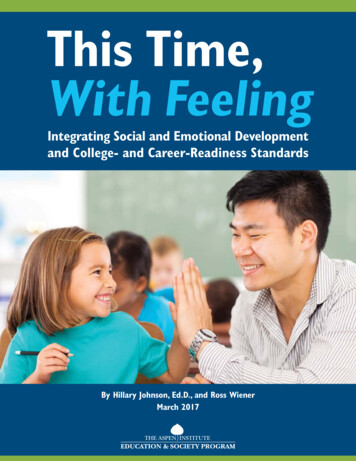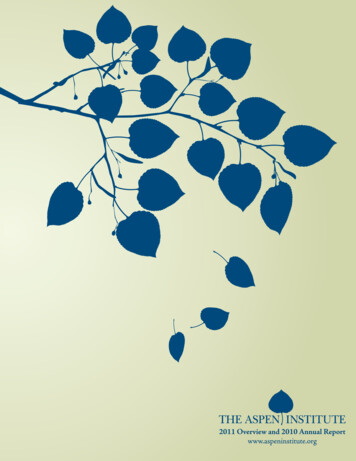
Transcription
About the Aspen InstituteThe Aspen Institute’s mission is twofold: to foster values-based leadership, encouraging individualsto reflect on the ideals and ideas that define a good society, and to provide a neutral and balancedvenue for discussing and acting on critical issues. The Institute does this primarily in four ways: Seminars, which help participants reflect on what they think makes a good society, therebydeepening knowledge, broadening perspectives, and enhancing their capacity to solve theproblems leaders face. Young-leader fellowships around the globe, which bring a selected class of proven leaderstogether for an intense multiyear program and commitment. The Fellows become betterleaders and apply their skills to significant challenges. Policy programs, which serve as nonpartisan forums for analysis, consensus-building, andproblem-solving on a wide variety of issues. Public conferences and events, which provide a commons for people to share ideas.The Institute is based in Washington, DC; Aspen, Colorado; and on the Wye River on Maryland’sEastern Shore. The Institute also has offices in New York City and an international network of partners.
“At the Aspen Institute we respect thetraditions of our values and ideals,but we are also looking to the futurefor how we can be more imaginativein a wide variety of fields—from theenvironment to education to foreignpolicy to creating the right new groupof young global leaders. We are tryingto find the most creative thinking andtranslate that into leadership.”Walter Isaacson, President and CEO, The Aspen Institute
The Power of Great IdeasAspen Institute founder Walter Paepcke was a great believerin the transformative power of modern art in advertising. As chairman ofthe Container Corporation of America, Paepcke commissioned advertisingartwork over the years by many prominent artists, illustrators, and designerswho celebrated great ideas, including this one from Alexis de Tocqueville’sclassic Democracy in America, a text that has served since the beginning ofthe Aspen Institute as one of the core readings in its seminars.The values and principles of democracy have been at the forefront ofa number of the Institute’s recent programs and partnerships, fromconferences on educating for democracy in a digital age and reports onthe information needs of democratic communities to conversations aboutprivacy and democracy, a series on civility and making our democracywork, discussions of women as a critical force in democratic governance,dialogues on democracy and our schools, projects on economic opportunity,and considerations of whether democracy will take root in the Arab worldas protests and uprisings sweep across the Middle East and North Africa atwhat seems to be a defining moment for the region.Since its creation more than 60 years ago, the Aspen Institute has witnessedtimes of enormous change at home and abroad, and it has alwaysremained a place where those changes can be examined and understoodfrom different perspectives. Just as Walter Paepcke wanted his companyadvertising to serve a public interest, so the Aspen Institute’s seminars,policy programs, public events, and leadership programs serve the publicinterest by addressing urgent social and cultural issues, educating leadersand decision-makers of all kinds, seeking policy solutions, and offering avenue for informed public debate and nonpartisan dialogue.As these pages describe, the power of great ideas—old and new—continues to inform our mission, drive our work, and guide our commitmentto understanding the world both as it is and as it should be.
“The Aspen Institute intends to be aplace of excellence and excitementwhere men and women of the finestqualities of mind and spirit fromall walks of life in the United Statesand abroad can meet to learn fromone another by serious discussion ofthe most important problems facingman and the greatest ideas that havebeen expressed throughout historyconcerning these problems.”Joseph E. Slater, President of the Aspen Institute, 1969-1986Robert O. Anderson, President of the Aspen Institute, 1957-1963,and Chairman of the Board of Trustees, 1963-1987From their foreword to Aspen Readings, an anthology of textsused in the early years of the Aspen Seminar program.
ContentsPolicy Programs and Partnerships10Public Programs26Seminars32Leadership Programs36Society of Fellows40Selected Highlights of Our Work42International Partners44Our Locations45Aspen Institute Leadership46Policy Program Directory47Board of Trustees492010 Annual Report52Donors54
Policy Programsand PartnershipsAdvancing Public Policy Through Dialogue and Actionwww.aspeninstitute.org/policy-workThe Aspen Institute policy programs advance public and private sectorknowledge on the most pressing issues facing contemporary society.Policy programs frame critical topics, bring new evidence, propose innovativenew ideas, and convene leaders and experts to reach constructive solutionsto issues. While each is unique in substance and approach, the Institute’spolicy programs share a common mission and methodology. Each serves asan impartial forum, bringing a diversity of perspectives together in informeddialogue, research, and action.10Homeland Security Secretary Janet Napolitano along with her predecessors Tom Ridgeand Michael Chertoff with NBC News correspondent Andrea Mitchell commemoratingthe eight-year anniversary of the Department at an Aspen Institute Homeland SecurityProgram/Georgetown University event. (photo by Barry Bahler)
www.aspeninstitute.org11
Advocacy Planning andEvaluation Programwww.aspeninstitute.org/apepAscend, the Family EconomicSecurity Programwww.aspeninstitute.org/ascendThis program helps its partners andclients plan and evaluate efforts toshape public policy. Program staff andconsultants work with foundationsand nongovernmental organizations inthe United States, Africa, and Europeassessing advocacy efforts on issues asdiverse as curbing obesity, combatinghuman trafficking, and increasing accessto family planning. The program alsoleads the Institute’s internal programreview process.Ascend is a hub for breakthrough ideasand proven strategies that move parents,especially women, and their childrenbeyond poverty toward educationalsuccess and economic security.Ascend’s work builds on lessons learnedinternationally about the power of investingin women and encourages similarinvestments in the US. Ascend takes a“two-generation” approach, focusing onopportunities for both parents and theirchildren. The program concentrates onthree key content areas — education,economics, and social capital. Ascend’score strategies are to change theconversation around low-income familiesin the US, convene and engage acrossdiverse sectors to build political will anddevelop a network of leaders, and elevateeffective two-generation policies andcommunity solutions.Agent Orange in Vietnam is bipartisan program promotesdialogue in the US policy community andamong US and Vietnamese officials oneliminating the health and environmentalimpact of wartime herbicides in Vietnam.It sponsors meetings and briefingson dioxin, the highly toxic chemicalcompound in the defoliant AgentOrange, and strengthens US-Vietnamesecooperation on mitigating contaminationproblems. The program also buildspublic support through education andadvocacy for practical solutions, such assoil-restoration and community-healthprograms, education and treatmentcenters, improved services for thosewith dioxin-related disabilities, localenvironmental training, and remediationwork at contaminated sites. In 2010,the Agent Orange in Vietnam Programreleased a ten-year plan toaddress the toxic legacy ofdioxin contamination.12Aspen Global Health and Developmentwww.aspeninstitute.org/ghdThe mission of this program is toidentify breakthrough solutions forglobal health and poverty by informingand strengthening the capacity ofpolitical leaders, moving countrylevel best practices to global policyattention, developing and promotingnew evidence, and providing high-levelforums for debate and implementationof innovative strategies that have thepotential to result in positive, largescale outcomes. The program currentlysupports the development of four ideas:building the capacity of public-sectorleaders and institutions in health crisiscountries; recognizing reproductive
health as a key contributor to otherdevelopment outcomes; adopting policyinnovations to address the global healthworkforce shortage, with a special focuson the role of health worker migration andcollaborative solutions to health workerimbalance; and investing in high valueadded African agriculture.Aspen Network ofDevelopment Entrepreneurswww.aspeninstitute.org/andeANDE is a global network of organizationsthat propel entrepreneurship in emergingmarkets. Its 130-plus members—drawnfrom nonprofits, investment funds,foundations, and research institutions thatwork in 150 developing economies—are atthe vanguard of a movement focused onsupporting small and growing businessesthat create economic, environmental, andsocial benefits for developing countries.The network advocates that policymakersand financial leaders drive more resourcesto these entrepreneurial businesses. ANDEhosts conferences and training programsfor capacity development builders andinvestors and provides financial support forinnovative partnerships aimed at improvingservices to emerging-market entrepreneurs.It also sponsors annual events focusedon the small-business sector, includinga conference on key trends and newdevelopments, a workshop on metrics andimpact assessment, and an orientationsession for new employees of networkmembers. ANDE has regional chapters inBrazil, Central America, East Africa, India,and South Africa. Additional chapters areenvisioned for 2011.Aspen Strategy Groupwww.aspeninstitute.org/asgHow can America’s national securityestablishment better adapt to nascentthreats and security challenges? Ascurrent global trends defy traditionalnotions of international relations, whatcommon problems do nations face in the21st century? This program examinesforeign policy trends by focusing ontransnational issues that blend foreignand domestic subjects. Founded in1984 with a concentration on strategicrelations, arms-control issues, and theUS-Soviet relationship, its roots asan annual conference for researchersassociated with arms-control projects atuniversities and think tanks date backto the 1970s. As the group evolved, italso included legislators, governmentofficials, business and industryrepresentatives, and journalists. Thecurrent program has moved beyond itsCold War origins and today includesa new generation of policymakersrepresenting a range of perspectives.The approach, however, has remainedconstant: to use a bipartisan lens toidentify the most contentious foreignpolicy and national security concernsfacing our nation and to assessAmerica’s evolving interests. Recentworkshops, briefings, and reports havecovered American interests in SouthAsia, the global economic crisis andits implications for foreign policy andnational security, the national securityimplications of climate change, Chinain the 21st century, and the challengeof nuclear proliferation. An ongoingUS-India dialogue also meets underthe auspices of the group, as well asthe Aspen Ministers Forum, a meetingwww.aspeninstitute.org13
of former foreign ministers from acrossthe political spectrum who developnonpartisan recommendations foraddressing common global challenges.Business and Society Programwww.aspeninstitute.org/bspThe program builds on 60 years of AspenInstitute programming to help establishedand emerging business leaders put valuesat the heart of practice. Through dialogue,research, and outreach, this programcreates opportunities for executivesand educators to explore new routesto business sustainability and valuesbased leadership. The Corporate ValuesStrategy Group for business executivessupports long-term thinking in businessand investing through change in corporatepractice, as well as in public policy. TheAspen Center for Business Education isthe home to several signature programsincluding Beyond Grey Pinstripes, asurvey and ranking of business schoolsthat integrate social and environmentalstewardship into their curricula andresearch, and CasePlace.org, a resourcefor online case studies and MBA teachingmaterials on topics ranging from corporategovernance and accountability toentrepreneurship, ethics, and stakeholdermanagement. The First Movers fellowshipis for exceptional business innovators whoare integrating profitability and social valuein their companies.Center for Native American Youthwww.aspeninstitute.org/cnayFounded by former US Senator ByronDorgan, the Center is dedicated toimproving the health, safety, andoverall well-being of Native Americanyouth through communication, policydevelopment, and advocacy. Despitethe efforts of tribal governments andadvocates, difficult conditions persistin many tribal communities. High ratesof unemployment, poverty, alcohol andsubstance abuse, crime, and healthdisparities in Indian Country all havean impact on the lives of young NativeAmericans. Too many Native youth facelong odds to success when confrontedwith these daunting challenges. TheCenter seeks to raise awareness ofthese issues by increasing the dialoguebetween Native youth, tribal leaders,advocacy organizations, academicinstitutions, and other experts throughroundtables, summits, and other eventsheld throughout Indian Country. Technicalassistance is also provided to tribalgovernments and organizations to identifyand secure programs and resources andto encourage replication of successfulprevention programs. Strong partnershipswith tribal leaders and organizations arecritical to the program’s success.College Excellence Programwww.AspenCCPrize.orgImproving college completion rates fromtheir current level of 50 percent is a vitalnational priority. Over the past 50 years,increased college access has benefittedmillions of Americans, but now the nationmust get more students successfullythrough college with the skills and abilitiesneeded for success in a knowledge-basedeconomy. The goal of this program is to14
“In emerging markets, small and growingbusinesses can become the backboneof economic growth and are critical toexpanding prosperity for the poor.Market-based approaches to povertyreduction are a viable, but underutilized,model for providing key products andservices to disadvantaged populations.”Aspen Network of Development EntrepreneursAgriculturalists at Nandan Biomatrix Limited inspect jathropa seedlings. Nandan is a Hyderabad, India-based portfolio company of New Ventures,a founding member of Aspen Network of Development Entrepreneurs. (photo by John-Michael Mass/Darby Communications)15
identify and accelerate the replication ofcampus-based practices and policies thatimprove student success. The program’sfirst initiative is the Aspen Prize forCommunity College Excellence, which willaward one million dollars annually to thenation’s best community colleges. Theprize aims to bring together communitycolleges around a measurable definitionof excellence and to recognize communitycolleges that achieve exceptional studentresults. By focusing on student successand highlighting models that work, theprize will honor excellence, stimulateinnovation, and create benchmarksfor measuring progress. Established inpartnership with the Joyce Foundation,the Lumina Foundation for Education,and the charitable foundations of Bankof America and JP Morgan Chase, thefirst million-dollar award will be made inDecember 2011.Commission on No Child Left Behindwww.nclbcommission.orgThis bipartisan, independent effortbuilds support for improvements infederal education policy in order tospur academic progress and closeachievement gaps. In the years sincethe release of its blueprint for improvingthe landmark No Child Left Behind Act,major strides have been made towardsome of its key recommendations,including measuring teacher qualityprimarily on effectiveness in increasingstudent achievement, strengtheningschool leadership, developing commonstandards and assessments, improvingthe use of data, and undertakingmore aggressive interventions in lowperforming schools. Co-chaired byTommy Thompson, former US Secretaryof Health and Human Services, and RoyBarnes, former Governor of Georgia, theFrom left to right: Democratic political strategist Donna Brazile, Juan Williams of Fox News, University of Southern California political science professorJane Junn and former Republican National Committee chair Michael Steele at the Aspen Institute Symposium on the State of Race in America sponsoredby the Institute’s Communications and Society Program and the Roundtable on Community Change. (photo by Laurence Genon)16www.aspeninstitute.org
commission includes leaders of nationalcivil rights organizations, state legislators,successful principals and teachers,business leaders, state education chiefs,school superintendents, higher educationleaders, researchers, and school boardmembers. Together, they are working todevelop updated recommendations thatwill advance effective education reform.Commission to Reform the FederalAppointments The Aspen Institute, with support fromthe Rockefeller Foundation, formed in2010 this independent, nonpartisan effortto evaluate the federal government’svetting and clearance procedures, identifyopportunities for improvement, and workwith interested parties to effect reformof the process. The commission is cochaired by former US Senators Bill Fristand Chuck Robb and former White Houseofficials Mack McLarty and Clay Johnson.The Commission was created to workwith the White House, Congress, andother interested parties to help identifyand adopt measures to streamline andexpedite the vetting process withoutsacrificing high standards of quality forgovernment leaders. The goal is to assurethat Presidents can more quickly fill keypositions particularly during the first sixmonths of a new administration with thequalified people necessary to serve thepublic interest, while reducing the burdenand intrusiveness on nominees.Communications and Society Programwww.aspeninstitute.org/c&sThis program serves as a venue forglobal leaders and experts to exchangeinsights on the societal impact of digitaltechnology and network communications.It also creates a multidisciplinary space inthe communications policymaking worldwhere veteran and emerging decisionmakers can explore new concepts anddevelop policy networks. The programconvenes approximately ten leadershiproundtables each year on subjects suchas new technologies and democraticvalues, business models to sustainjournalism, communications industriesand the environment, reforms in spectrumpolicy, public-service media, mobiletechnologies, cloud computing, andbroadband communications policies.Leaders from across disciplines andperspectives engage in moderateddiscussions that culminate in specificconclusions and recommendations.Meetings have led to the creation of theKnight Commission on the InformationNeeds of Communities in a Democracy,new initiatives in public media, and theFederal Communications Commission’snew media inquiry. Conference reportsare distributed to key policymakers andopinion leaders around the world and arealso made available to the public online.Community Strategies Groupwww.aspeninstitute.org/csgSince 1985, this group has equippedcommunity leaders to connect with thebest ideas, tools, and strategies availableto improve economic development,strengthen families, sustain naturalresources, create locally controlledphilanthropic assets, and build vital andjust civic cultures. The group’s hallmarkis tailored, peer-to-peer exchanges inwhich community-based leaders createimmediate back-home action plans.It convenes action-learning sessionsfor teams from multiple locations and17
““Improving student learning on theschool level is unlikely to succeedwithout reassessing the system in whichschools operate.”Education and Society ProgramOrganisation for Economic Co-operation and Development Secretary General Angel Gurria and Karen Kornbluh, US Representativeto the OECD, at the Education for Innovation town hall held at the Newseum, sponsored by Intel Corporation. (photo by Laurence Genon)18www.aspeninstitute.org
organizes site visits for peer communitiesto examine exemplary communitychange at close range. It brings togetherdisconnected leaders from a specificgeographic region to collaborate and findcommon aims. The group also connectscommunity innovators with regionaland national experts and funders. Itdevelops community lessons into actionguides, good-practice profiles, and webresources. Through its Rural DevelopmentPhilanthropy Learning Network, the grouphas helped hundreds of community-basedbusiness, nonprofit, church, government,and civic leaders work together to growlocally controlled philanthropic fundsand use them to improve communityoutcomes. In its Family Economic SuccessInitiative, the group is engaging anexpanding network of community leadersacross the country to help hard-working,low-income families earn more, keep moreof what they earn, and grow what theysave into assets that reduce family andcommunity poverty over time.Congressional Programwww.aspeninstitute.org/congressionalThis program is a nongovernmental,nonpartisan, educational initiativefor members of the US Congressto strengthen their grasp of criticalpublic policy issues. It holds high-levelconferences offering legislators theopportunity to learn from internationallyrecognized academics, experts, andleaders to explore policy alternatives.Current subjects include nuclear security,policy challenges in the Muslim world,energy security, and education reform.Over the years, hundreds of members ofCongress, international parliamentarians,political and government leaders, andscholar-experts have been involved inthe program. There is no identificationwith a political or party viewpoint andno endorsement of specific legislation.No lobbyists, congressional staff, oroutside observers are permitted, and allconference agendas are reviewed by theHouse and Senate ethics committees.The program also sponsors two dozenannual breakfast meetings in the Capitolfeaturing distinguished scholars andinternational experts.Council of Women World Leaderswww.aspeninstitute.org/cwwlThis network of 45 current and formerwomen heads of state and governmentmobilizes women leaders for actionon issues of global importance andenhances the experience of democracyaround the world by increasing thevisibility, effectiveness, and number ofwomen leaders. The council provides aplatform for members to participate inhigh-level summits, discuss their policyagendas, and raise global issues ofcritical importance to women throughits Spotlight on Leadership Series. TheMadeleine K. Albright Women’s Voicesat the Aspen Institute Series offersinternationally acclaimed experts a forumto address the gender dimensions oftimely policy issues and provide a catalystfor future action. Council programs alsoinclude the Business Case for WomenInitiative to promote the importance ofwomen’s leadership in the corporatesector and the Graduate FellowshipPrograms to allow graduate students towork with presidents, prime ministers,ministers, and leaders of internationalorganizations on important global issues,applying a gender perspective to theirwork and observing first-hand the waysleadership is manifested.www.aspeninstitute.org19
20Economic Opportunities Programwww.aspeninstitute.org/eopEducation and Society Programwww.aspeninstitute.org/educationThis program supports fields of practicethat make economic opportunity moreaccessible to those who are strugglingin the changing economy, includingworkforce training and education,microenterprise development, andfinancial services. The programinvestigates and documents strategiesfor economic opportunity that work.It develops practical tools that helpprogram leaders better implementthose strategies, and it offers leadershipdevelopment opportunities forcollaborative learning about promisingpractices designed to help low-incomeindividuals start businesses, find betterjobs, and build wealth. It activelyengages leaders of community-basedorganizations, community colleges, andlocal government, as well as leaders frombusinesses and philanthropy, and it seeksto bring the voices and experiences oflocal initiatives into policy discussions.The program is currently composedof four related initiatives: Access toCapital and Credit; the MicroenterpriseFund for Innovation, Effectiveness,Learning, and Dissemination; Skills forAmerica’s Future; and the WorkforceStrategies Initiative. Projects in theseareas include developing an onlineplatform that organizations can use tohelp low-income individuals connect tomainstream financial services, conveningphilanthropic leaders to discussinvestment strategies in microenterprise,and investigating key features that lead tosuccess in community college-nonprofitcollaborations.Recognizing the importance of effectiveeducation policy to improve US schools,this program convenes workshops forfederal, state, and local policymakers,education leaders, researchers, andanalysts to provide ongoing peer-to-peerlearning and professional development.It facilitates knowledge-sharing amongurban school district leaders abouthow school systems can improvethe education and life chances of allstudents. Program participants also workto identify solutions that will support,nurture, and develop new cadres ofleaders in schools and classrooms. Inaddition, the program’s Aspen SeniorEducation Congressional Staff Networkinforms federal policy development byassisting congressional staff members inbetter understanding innovations in thefield, shared challenges, and the impactof federal education laws on states andurban school districts.Energy and Environment Programwww.aspeninstitute.org/eeThis interdisciplinary policy programstimulates open-minded dialogue aboutthe state of the natural world, globalenergy, environmental challenges, andsustainable solutions. It draws on theknowledge and experience of leadersin science, government, business, andcivil society and raises public attentionthrough policy dialogues and forums, aleadership initiative, and majorpublic events. For more thanthree decades, its EnergyPolicy Forum has convenedsenior industry, government,environmental, and otherleaders to report on a
broad range of energy issues, includingclimate change, electricity markets,nuclear power, renewable fuels, andfuel efficiency. At its Global Forum onEnergy, Economy, and Security, expertsand policymakers discuss oil and gasissues and global markets. Its newlycreated Clean Energy Roundtableaddresses commercial and public policyissues at the intersection of renewableenergy, clean technology, innovation,and financing. In 2010, the programcontinued to advance policy discussionson the impact and governance of climatechange in the Arctic, conservation andhuman development, and internationalinstitutional responsibilities for validatingemerging carbon markets. Theprogram also spearheads the Institute’sCatto Fellowship Program for youngenvironmental professionals and partnerswith National Geographic to convene theannual Aspen Environment Forum. Theseefforts advance collaborative dialogueand collective knowledge to help solvecritical environmental problems.Global Initiative on Culture and Societywww.aspeninstitute.org/cultureandsocietyIn the midst of growing recognition of thepower of artistic and cultural expressionto inspire solutions to societal challenges,sustain livelihoods, and create conditionsnecessary for social change, this initiativeseeks to build a neutral platform forreflection, network-building, policyformulation, leadership development, andresource mobilization in the fields of arts,culture, and socioeconomic development.Through domestic and internationalroundtables, forums, seminars, andsummits, it fosters leadership andraises awareness of the value of artsand culture in human development,employment creation, cross-culturaldialogue, international exchanges, andpeace-building. The initiative createsand convenes networks of leadingprofessionals from diverse backgroundsto share information, generate arts andculture policy debates, and seed newactions. Recent activities have includedmeetings of the Aspen Cultural DiplomacyForum in Paris, France; Aviles, Spain;and Washington, DC. The initiativefacilitated the creation of the Arts andBusiness Council for the city of Rio deJaneiro, Brazil; and organized a dialoguein Aspen on the power of fashion thatengaged distinguished fashion industryinsiders in a candid conversation onthe interdependent dynamic of fashion,cultural identities, international relations,socioeconomic development, povertyalleviation, environmental concerns,entertainment, and human security. AnROH Muscat – Aspen Creative Arts WorldSummit is scheduled for November2011 in Oman; and an Aspen CulturalDiplomacy Forum in Tokyo is slated for2012. Also on the horizon are a Fashionand Society Forum in the US, a CulturalEnterprise Development Roundtablein China, and a series of national andregional meetings in Africa, Latin America,and the Middle East to address cultureand socioeconomic developmentchallenges and opportunities.Health, Biomedical Science,and Society Initiativewww.aspeninstitute.org/healthThis program is a venue for academic,government, and industry leaders toexplore critical issues in health careand health policy and to understandtheir effects on the health of individuals,families, communities, nations, andwww.aspeninstitute.org21
the world. By convening bipartisan,multidisciplinary forums, the programfacilitates the exchange of knowledgeand insights among decis
The Institute is based in Washington, DC; Aspen, Colorado; and on the Wye River on Maryland's Eastern Shore. The Institute also has offices in New York City and an international network of partners. A t the Aspen Institute we respect the . Program/Georgetown University event. (photo by Barry Bahler) Policy Programs


